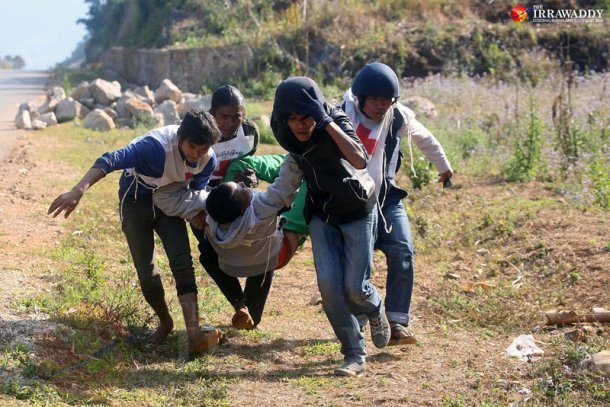Walking into Beatings, Running Away from Gunfire
By Burma Partnership • March 9, 2015 This week has seen the various organs of the state being employed to oppress and commit violence against students marching for education reform, workers striking for their rights, and ethnic nationality Kokang fleeing conflict. Thus we have seen the use of guns, thugs, repressive laws, and police brutality, exposing not just the range of the tools of government subjugation of its people, but the depths to which it will go to maintain power.
This week has seen the various organs of the state being employed to oppress and commit violence against students marching for education reform, workers striking for their rights, and ethnic nationality Kokang fleeing conflict. Thus we have seen the use of guns, thugs, repressive laws, and police brutality, exposing not just the range of the tools of government subjugation of its people, but the depths to which it will go to maintain power.
In downtown Rangoon on 5 March, 2015, around 200 people gathered to show their solidarity with the student marchers, currently barricaded by police in the town of Letpadan, 85 miles from Rangoon. This solidarity demonstration was violently broken up, not just by police, but by a gang of thugs, employed by the police to create disturbances and assault the protestors. These thugs, wearing red armbands with the word ‘duty’ are reminiscent of Swan Ah Shin group, who were used by the previous military regime in the Depayin Massacre in 2003 in which members of the National League for Democracy (NLD) were murdered, as well as the 2007 Saffron Revolution. Eight protestors were also detained overnight, including three members of the 88 Generation Peace and Open Society group. Meanwhile, the 100 students barricaded in Letpadan remain, with 500 police officers surrounding them, as the government refuses to allow them to continue their march to Rangoon.
This group of thugs were the same characters who helped police violently broke up the strikes in Shwepyithar industrial zone the day before. After the remnants of a strike demanding a liveable wage and better working conditions attempted to walk to City Hall in Rangoon police stopped them before moving in with their hired thugs to use violence and arrest 13 people as well as two journalists. While this may be the nail in the coffin for this particular episode of industrial action that began in early February, it is surely not the death of the movement towards better living and working conditions in the nascent garment industry.
While the imagery of walking into violence and oppression has been prevalent in the media, as the brave students and workers have been attempting to do the past few weeks to demand their fundamental rights, it mustn’t be forgotten that in the same week, ethnic Kokang in northern Shan State have had no choice but to run away from violence and oppression. This, however, was not perpetrated by the police or thugs, but by the Burma Army, and this oppression takes the form of a more extreme violence, as torture replaces beatings and fatal shootings replace arrests. Yet many of the 50,000 refugees who fled the area have been forced to walk back into the warzone as China, which border the Kokang area, is restricting the influx of refugees and now pressuring them to return as it is eager to maintain good relations with Naypyidaw given its many investments in Burma. Yet as Matthew Smith, of Fortify Rights pointed out last week, “If Beijing wants stability on its 1,370-mile border with Myanmar, it should fulfill its obligations as a party to the (UN) 1951 Refugee Convention and protect all asylum seekers, no matter their ethnicity….. and the Chinese should never force anyone back across borders into conflict zones.”
The past week has not only been a terrible week of headlines for Burma, it has also revealed, if it was ever effectively concealed, the barbaric nature of the state, whether that be police, government or military. The EU must question the training it has given to the police force, the US and UK must question its new relations with the Burma Army, and the EU, again, must question the support it is giving towards the garment industry. What is distinctly lacking, and this must come from within, from those in power themselves, is political will. The political will to allow civilian oversight of the Burma Army and the rest of the security service apparatus and reign in its power, the political will to engage in good-faith bargaining with striking workers and enact legislation that protects their rights, and the political will to negotiate with students over education reform, rather than trying to bury the issue using divide and rule tactics as well as fear and violence. Otherwise, many more students and workers will walk into beatings and arrests, and many more ethnic minorities will run away from shootings and bombings while the urgently needed national reconciliation process, essential for Burma to become one nation and one community will remain a fault line for years to come.
Tags: Burma Army, Kokang, National League for Democracy, Saffron Revolution, studentsThis post is in: Blog
Related Posts21st Century Panglong Conference Reaffirms Obstacles to Peace
Torture, extrajudicial killing, and use of civilians as human shields by Burma Army during new offensive against SSPP/SSA near Upper Yeywa dam site in Kyaukme
Time for a Fresh Start for Genuine Peace
An Open Letter to World Leaders on the Fourth Anniversary of The Resumption of War Calling Urgently for Humanitarian Aid for The Internally Displaced People of Northern Burma
The Burma Government Must Stop Condoning Sexual Violence in Conflict Areas









 All posts
All posts